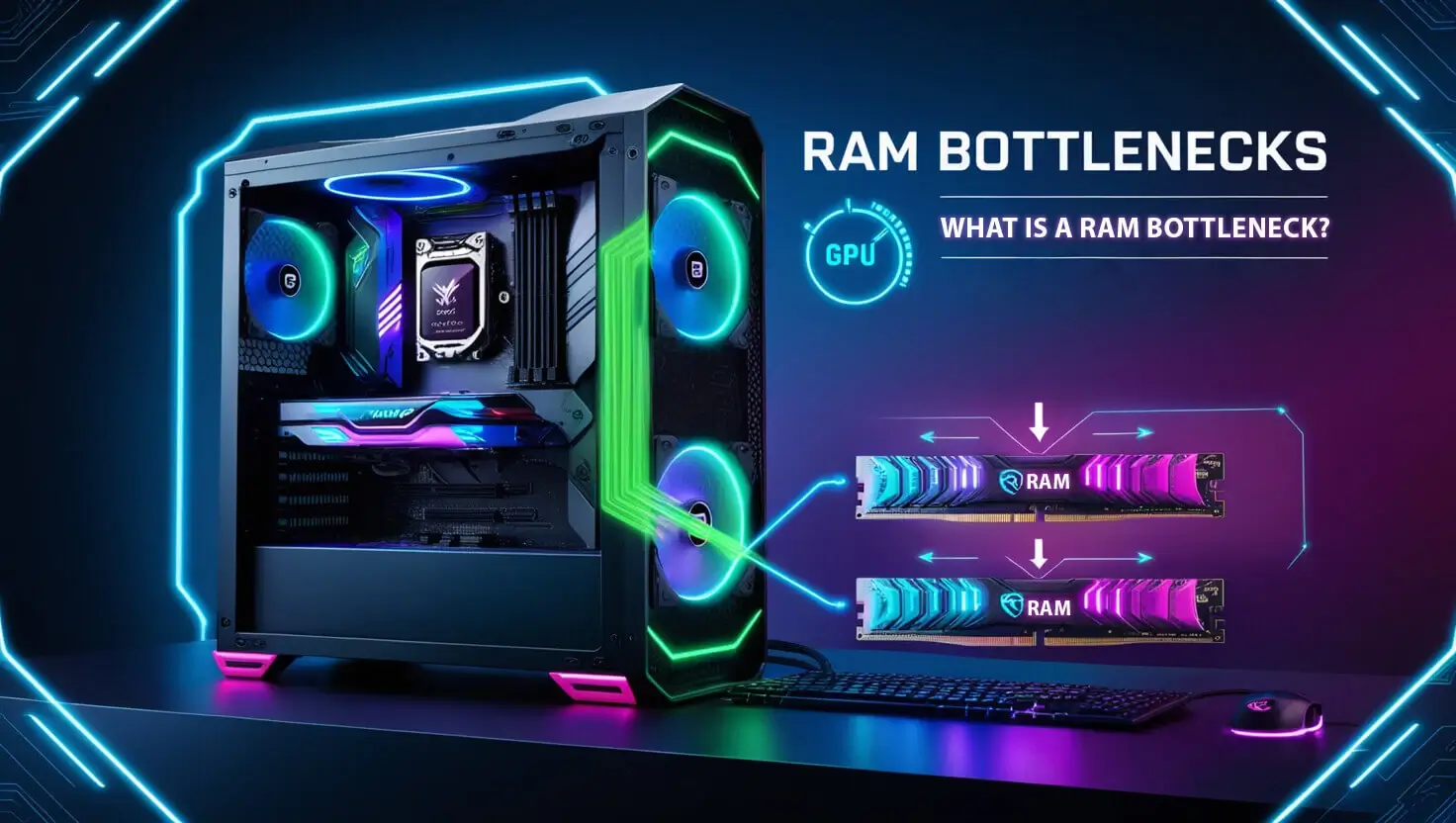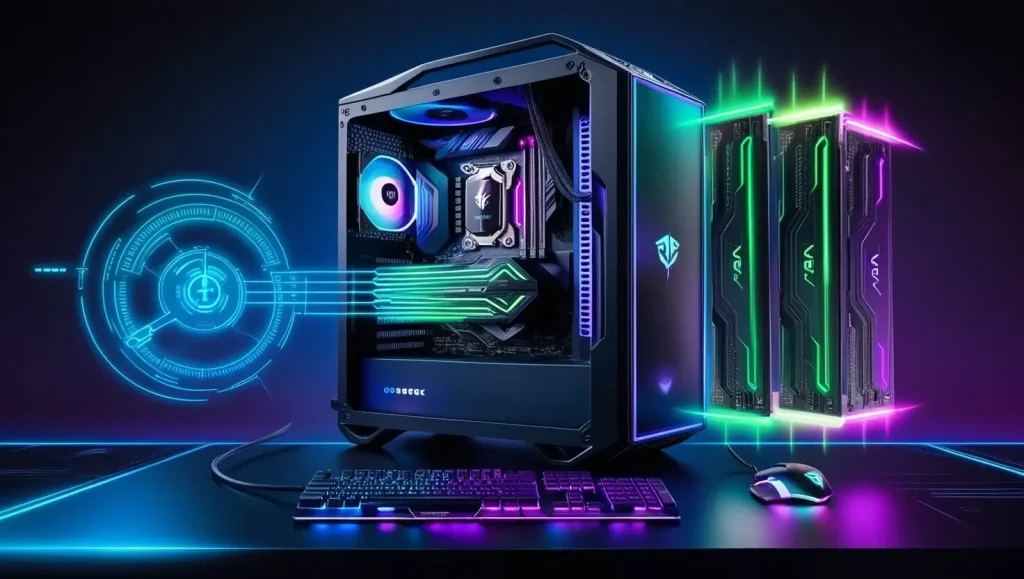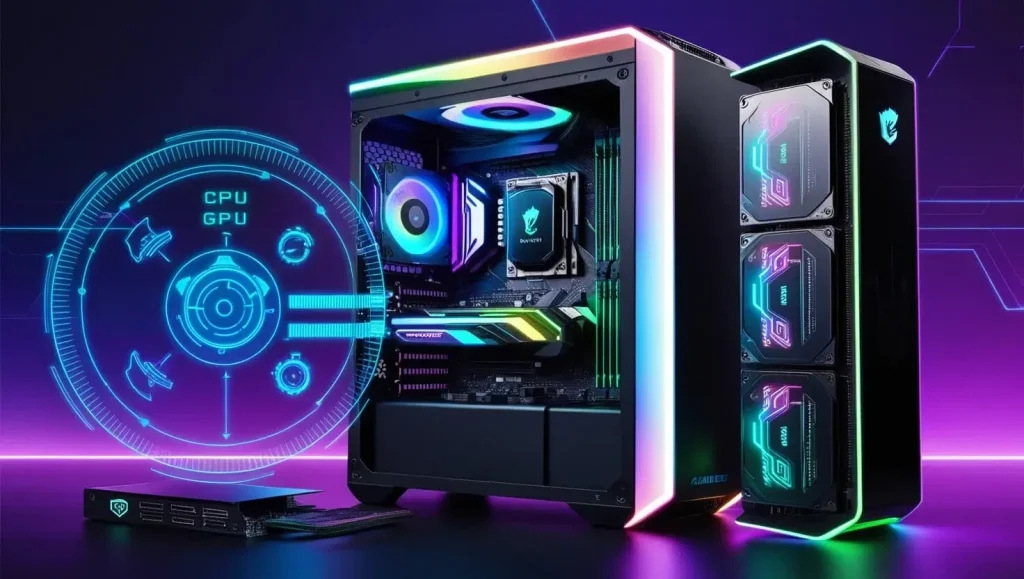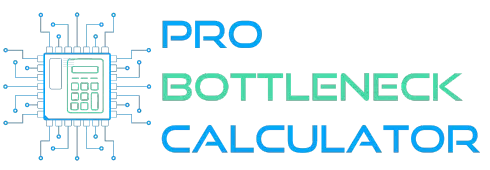RAM Bottleneck Calculator

In the world of PC gaming and high-performance computing, bottlenecks are a common concern. A bottleneck occurs when one component in a system limits the performance of other components, preventing the system from reaching its full potential.
For many users, RAM is a frequently overlooked source of bottlenecks. Understanding how RAM can impact your CPU and GPU performance, and using tools like our bottleneck calculator, can help you ensure your system runs smoothly.
What is a RAM Bottleneck?
A RAM bottleneck occurs when the speed or capacity of your RAM limits the performance of your CPU or GPU.
Since RAM acts as a bridge between these components, insufficient or slow RAM can prevent your CPU or GPU from processing data efficiently, leading to slower performance and lag, especially in resource-intensive applications.
How Can RAM Cause Bottlenecks?
RAM bottlenecks typically occur due to:
1. Insufficient Capacity
If your system doesn’t have enough RAM to handle the data being processed, it has to rely on the hard drive or SSD, which is much slower. This is especially noticeable in gaming, video editing, and multitasking.
2. Low Bandwidth or Speed
The speed of your RAM affects how quickly data is moved between the CPU and RAM. If the RAM is too slow, it can bottleneck both the CPU and GPU.
Using a RAM Bottleneck Calculator
A RAM bottleneck calculator is a tool that helps you identify potential bottlenecks in your system by analyzing your CPU, GPU, and RAM specifications.
By entering details such as your CPU model, GPU model, and RAM speed/capacity, a RAM bottleneck calculator can estimate if your RAM is limiting performance.
Benefits of a RAM Bottleneck Calculator
1. Identify Upgrades
The calculator helps pinpoint if RAM is causing performance issues, allowing you to make informed upgrade choices.
2. Optimize Gaming Performance
Gamers benefit significantly by finding the right balance between CPU, GPU, and RAM to avoid frame rate drops and ensure smooth gameplay.
3. Improve Multitasking and Productivity
RAM bottleneck calculators also benefit professionals using applications that rely heavily on memory, such as video editing or design software, by highlighting areas for improvement.

Is My RAM Bottlenecking My GPU?
In gaming setups, it’s essential to have a well-matched GPU and RAM to avoid any unnecessary performance constraints. A high-end GPU can be bottlenecked by insufficient RAM, especially if the games or applications demand high memory usage.
Here are a few signs that your RAM might be bottlenecking your GPU:
- Frame Drops and Lag: If your games are lagging, despite having a powerful GPU, the issue could be related to your RAM.
- Stuttering in High-Resolution Settings: RAM bottlenecks can cause stuttering or frame drops when playing games in 4K or with ultra settings, as the GPU can’t process data fast enough due to limited RAM bandwidth.
Using a RAM bottleneck calculator can clarify if the RAM is restricting your GPU’s potential. Ideally, your RAM capacity should align with the demands of your GPU. For most modern games, 16GB of RAM is recommended, but 32GB might be more appropriate for high-end setups and multitasking.
Can RAM Bottleneck the CPU?
Yes, RAM can indeed bottleneck the CPU, especially in systems that run demanding software or heavy multitasking environments.
If the RAM speed is not high enough to keep up with the CPU’s processing speed, this results in a bottleneck, where the CPU ends up waiting for data.
Here’s how to determine if your RAM might be limiting your CPU:
- High CPU Usage with Low RAM Usage: When your CPU is constantly at maximum usage, but your RAM usage is low, it might indicate the RAM is unable to feed the CPU with data quickly enough.
- Reduced Performance in Multitasking: If your system struggles with multiple applications or slows down significantly, it could be due to insufficient RAM capacity.
A bottleneck calculator for RAM can offer insights on whether an upgrade in RAM speed or capacity could improve CPU efficiency and overall system performance. If you’d like to dive deeper, here’s a guide on how to check for bottlenecks in your system.

Bottleneck Calculator for RAM: How to Use It
To use a bottleneck calculator effectively, gather details about your current system, including:
- CPU Model: Enter the specific model of your CPU, as each model has different requirements for RAM speed and capacity.
- GPU Model: If you’re trying to assess if RAM is bottlenecking your GPU, enter your GPU specifications.
- RAM Capacity and Speed: Provide the total amount of RAM and the clock speed.
Based on these inputs, the calculator can analyze if your RAM is up to par with the rest of your system. If the calculator indicates a RAM bottleneck, consider how to avoid bottlenecks and ensure your system’s components are well-matched for the best performance.
Optimizing Your System to Avoid RAM Bottlenecks
Here are a few tips to help you avoid or fix RAM bottlenecks:
- Upgrade to Higher-Capacity RAM: If you’re running multiple applications or playing demanding games, upgrading from 8GB to 16GB or 32GB of RAM can make a noticeable difference.
- Consider RAM Speed: While upgrading the RAM capacity is important, speed matters too. For most modern CPUs, RAM speeds of 3000-3600 MHz are optimal.
- Dual-Channel Memory: To enhance data transfer speeds, consider using two RAM sticks for dual-channel memory, which can improve performance over a single stick setup.
If your setup is GPU-heavy, you may also want to explore how to reduce GPU bottlenecks, as optimizing RAM alone might not always solve the problem completely.
Conclusion
Understanding and identifying bottlenecks in your PC’s RAM is essential for achieving optimal performance. A RAM bottleneck calculator can provide a helpful analysis of your system, pinpointing areas where memory might be limiting your CPU or GPU.
By using this tool and upgrading your RAM when necessary, you can avoid performance slowdowns and keep your system running at its best.
